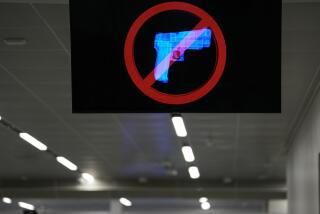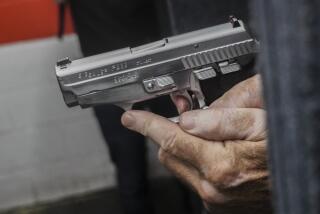Justices Say Jurors May Not Vote Conscience
SAN FRANCISCO â Jurors must follow the law--not their consciences--even when they strongly believe the law will produce an unjust result, the California Supreme Court ruled Monday.
The court rejected a centuries-old doctrine called âjury nullification,â which gives jurors the power to follow their convictions rather than the law.
âA nullifying jury is essentially a lawless jury,â Chief Justice Ronald M. George wrote for a unanimous court.
Nullification, a doctrine rooted in old English law, has been debated by judges, lawyers and legal scholars for decades. In recent years, advocates of nullification have seen it as a weapon against unpopular tax laws and increasingly harsh criminal sentences.
Mondayâs ruling was the first in which the state high court directly confronted the principle. The court held that a judge properly excused a juror who said he could not convict an 18-year-old man of unlawful sex with a minor--the defendantâs 16-year-old former girlfriend.
âEncouraging a jury to nullify a law it finds unjust or to act as the âconscience of the communityâ by disregarding the courtâs instructions may sound lofty,â George wrote, âbut such unchecked and unreviewable power can lead to verdicts based upon bigotry and racism.â
The court acknowledged that in criminal cases, juries may continue to nullify the law unless the judge discovers it before a verdict. Although a judge can throw out a guilty verdict if it was not supported by the evidence, a jurist has no authority to override a verdict that favors a defendant.
Mondayâs decision, however, is likely to deter nullification because a new jury instruction requires jurors to inform the judge whenever a fellow panelist appears to be deciding a case based on his or her dislike of a law, said Deputy Atty. Gen. Karl S. Mayer.
Mayer, who represented the prosecution in the case before the high court, called the courtâs decision a âclear rejectionâ of jury nullification.
âIf it comes to the attention of the court, this should stop it,â Mayer said.
University of Santa Clara law professor Gerald Uelmen said the ruling is particularly timely because the new jury instruction will increasingly force judges to decide whether to remove jurors for nullification.
Even with the instruction, nullification probably will persist, he said. In most cases, âjury nullification is not explicit,â Uelmen said. âIt is almost subliminal. The jury applies a higher standard of reasonable doubt because they donât like the law.â
Nullificationâs history in the United State is long and broad: Northern jurors used it to protect runaway slaves prior to the Civil War and, conversely, some juries in the South refused to convict whites who killed or assaulted blacks or civil rights activists.
More recently, juries have spared draft resisters and marijuana users. Juries also have refused to find some defendants guilty because they believe sentences under the three-strikes law are too harsh.
American courts that have considered nullification have generally ruled against it. On the other hand, the constitutions of three states--Georgia, Indiana and Maryland--say that jurors should judge questions of law as well as fact.
Judicial decisions in those states have âessentially nullifiedâ the constitutional provisions, George noted in Mondayâs ruling.
Until this week, the California Supreme Court had not clearly confronted jury nullification because the practice is generally hidden from a courtâs scrutiny, lawyers said. Most jurors do not admit that they are basing their decisions on disagreement with the law.
Lawyers said the court also might have been more inclined to take on the subject now because of debate about jury nullification in the wake of such highly publicized cases as the O.J. Simpson murder trial. Once considered an arcane subject, jury nullification is frequently debated in scholarly circles and in the news media.
In ruling against nullification, the court considered the Santa Clara County case of Arasheik Wesley Williams, who was charged with raping his former girlfriend. To find that a rape had occurred, the jury also had to find that the defendant illegally had sex with a minor.
Williams had admitted he had sex with the teenager but said it was consensual. On the first day of juror deliberations, the foreperson informed the judge that one of the jurors refused to follow instructions on statutory rape because he believed the law was wrong.
Superior Court Judge Paul R. Teilh questioned the juror. âItâs been reported to me that you refuse to follow my instructions on the law in regard to rape and unlawful sexual intercourse, that you believe the law to be wrong, and therefore, you will not hear any discussion on that subject. Is that correct?â the judge asked.
âPretty much, yes,â the juror replied.
A few minutes later, the juror told the judge: âIâve been told [statutory rape] is a misdemeanor. I still donât see--if it were a $10 fine, I just donât see convicting a man and staining his record for the rest of his life. I think that is wrong. Iâm sorry, judge.â
The judge, over the defendantâs objections, replaced the man with an alternate juror. Williams was convicted of assault, false imprisonment and torture and sentenced to six years in prison.
He appealed on the grounds that the juror should have been allowed to remain on the panel because jury nullification is acceptable. The attorney for the defendant in the case could not be reached for comment.
While rejecting Williamsâ appeal, the court noted that juries still have the capability to nullify the law in criminal cases because of double jeopardy protection for defendants. A defendant who has been acquitted of a charge cannot be charged a second time with it, even if the court later learns jury nullification played a role in the verdict.
But these jury powers do not âdiminish the trial courtâs authority to discharge a juror, who, the court learns, is unable or unwilling to follow the courtâs instructions,â George wrote.
In a footnote, he said the court was expressing no view on whether a judge can instruct a jury specifically that it has no power, as opposed to right, to render a verdict contrary to the law.
By leaving the question unanswered, defense attorneys may try to inform juries that even though they are not supposed to nullify, they do have that power, McGeorge School of Law professor J. Clark Kelso said.
âSuppose defense counsel says, âJury, you have no right to make up the law, but you do have the power to do it.â Would that be improper? I donât know,â Kelso said.
Even with that possible opening, the ruling in People vs. Williams, S066106, will be helpful to prosecutors, Kelso said. âIt gives the prosecutor another tool in closing arguments,â the law professor said.
In a separate decision Monday, the court overturned a Los Angeles robbery conviction on the grounds that the judge had improperly dismissed a holdout juror. Superior Court Judge Richard R. Romero replaced the juror with an alternate after fellow jurors complained that he was refusing to deliberate.
The state high court ruled that the evidence did not support the finding. âThe juror simply viewed the evidence differently from the way the rest of the jury viewed it,â George wrote.
The dismissed juror may have âemployed faulty logic and reached an âincorrect result,â but it cannot properly be said that he refused to deliberate,â George said in People vs. Cleveland, S078537.
More to Read
Get the L.A. Times Politics newsletter
Deeply reported insights into legislation, politics and policy from Sacramento, Washington and beyond. In your inbox three times per week.
You may occasionally receive promotional content from the Los Angeles Times.











